阿里vs騰訊:中國(guó)王者之爭(zhēng)
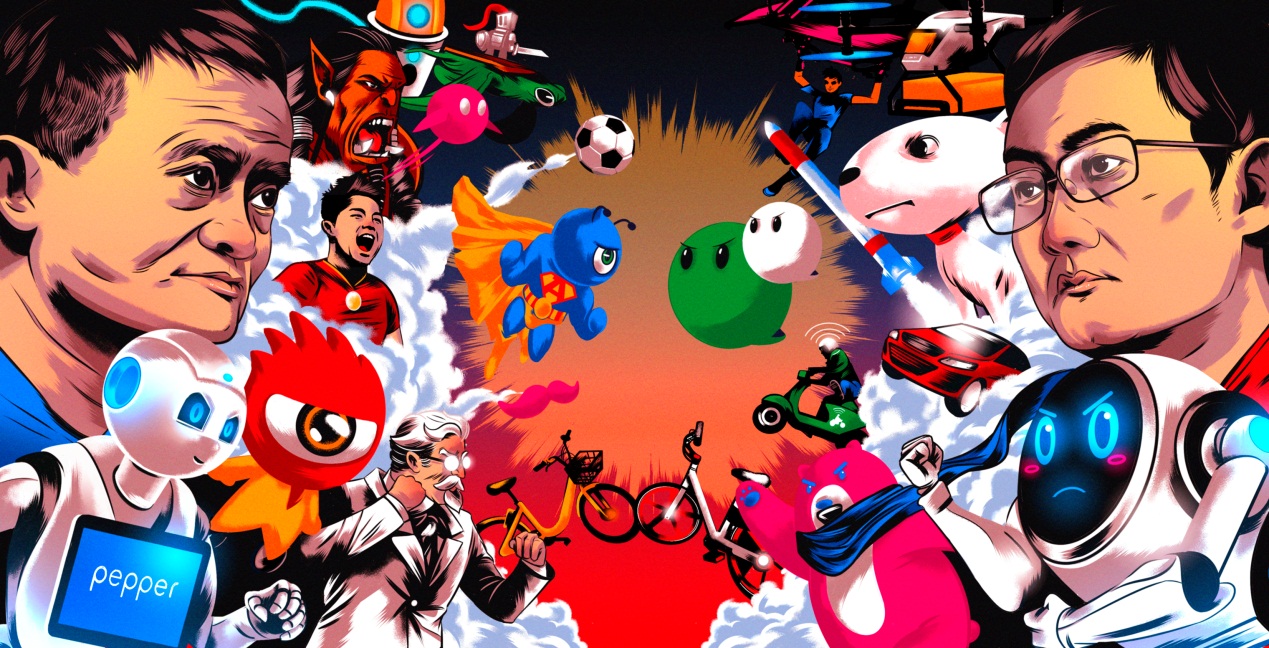
|
巨頭間的沖突避無(wú)可避,。冷戰(zhàn)時(shí)期的世界命運(yùn)系于美蘇對(duì)峙,??煽诳蓸?lè)和百事可樂(lè)曾經(jīng)斗得不可開(kāi)交,。拳王阿里和喬治·福爾曼之爭(zhēng)貫穿整個(gè)拳擊黃金時(shí)代。連娛樂(lè)界都有泰勒·斯威夫特和坎耶·維斯特的口角沖突,。(看看他都讓她干了些什么,。) 但僅論對(duì)全球商業(yè)的影響,這些史詩(shī)級(jí)的沖突和中國(guó)互聯(lián)網(wǎng)巨頭阿里巴巴與騰訊之爭(zhēng)毫無(wú)可比性,。兩家企業(yè)的市場(chǎng)資本總額均高達(dá)5000億美元,。他們都在快速發(fā)展的中國(guó)數(shù)字產(chǎn)業(yè)占據(jù)重要版圖:騰訊擁有最大的游戲和通信平臺(tái),阿里巴巴統(tǒng)治著電子商務(wù)王國(guó),。他們?cè)趪?guó)內(nèi)外都大舉投資,。都不是誕生在嚴(yán)格意義的一線城市,但被當(dāng)?shù)厝艘詾楹溃喊⒗锇桶臀挥谏虾8浇墓懦呛贾?,騰訊在毗鄰香港的全新都市深圳,。最后一點(diǎn),兩家企業(yè)在這個(gè)人口第一大國(guó)的用戶比例都高得令人咂舌:阿里巴巴的各類線上市場(chǎng)擁有5.52億活躍用戶,;騰訊的微信通信平臺(tái)賬戶數(shù)量最近突破10億,。 盡管有諸多相似之處,騰訊和阿里巴巴仍有明顯區(qū)別,,像蘋果和谷歌一樣,,在文化、風(fēng)格,、做法上都不同,。兩家公司都誕生于1990年代末,那時(shí)中國(guó)正處在探索互聯(lián)網(wǎng)的階段,。多年后,,他們?cè)趲缀趸ゲ幌喔傻念I(lǐng)域逐漸成長(zhǎng)為行業(yè)龍頭。然而,,雙方在發(fā)展過(guò)程中不可避免地會(huì)入侵對(duì)方領(lǐng)地,。比如騰訊正在進(jìn)軍零售和金融服務(wù)領(lǐng)域,這是阿里的優(yōu)勢(shì)業(yè)務(wù),。另一廂,,阿里也在騰訊的疆域上看到了突破口,,比如說(shuō)向阿里的眾多小企業(yè)用戶提供移動(dòng)通訊工具。 還有一點(diǎn)不可避免地會(huì)被人拿來(lái)比較,,兩家企業(yè)的最高領(lǐng)導(dǎo)都姓馬,,雖然阿里的馬云和騰訊的馬化騰沒(méi)什么關(guān)系。馬化騰的英文名Pony(意為小馬)就是這么來(lái)的,。這兩匹互聯(lián)網(wǎng)千里馬之間的競(jìng)爭(zhēng)是真正意義的雙馬爭(zhēng)雄,。他們爭(zhēng)的是在這個(gè)全球發(fā)展進(jìn)化最快的數(shù)字經(jīng)濟(jì)市場(chǎng)中坐上頭把交椅。 兩位馬先生是舊識(shí),,早就曾在公開(kāi)場(chǎng)合互致敬意,。但近年來(lái),雙方競(jìng)爭(zhēng)升溫,,這些稱贊更像是欲抑先揚(yáng)里的揚(yáng),,為的是明褒實(shí)貶——或者更甚。 比如說(shuō),,工程師馬化騰風(fēng)格低調(diào),,鮮少接受西方媒體采訪,卻在去年12月中國(guó)廣州《財(cái)富》全球論壇上抨擊了阿里巴巴,。因?yàn)榘⒗锲煜碌碾娚听堫^網(wǎng)站淘寶向商家收取服務(wù)費(fèi),,46歲的馬化騰把這個(gè)對(duì)手比作貪婪的地主?!拔覀儾缓秃献骰锇楦?jìng)爭(zhēng),,而是要為其賦能”,馬化騰通過(guò)翻譯用中文發(fā)言,。他說(shuō)阿里巴巴可以隨心所欲地向租戶加租,“騰訊沒(méi)有商場(chǎng),,不向商戶出租商鋪,。”他說(shuō)騰訊的平臺(tái)是“去中心化的”,,用戶可以在平臺(tái)上脫離騰訊獨(dú)立出售商品,,不用“交租”。 幾個(gè)月后,,天生擅長(zhǎng)侃侃而談的商界明星馬云不指名道姓地報(bào)了一箭之仇,。眾所周知,騰訊擅長(zhǎng)從平臺(tái)中盈利,?!拔覀兊钠髽I(yè)文化非常不同”,阿里巴巴這位53歲的創(chuàng)始人最近在杭州總部用英語(yǔ)接受采訪時(shí)意味深長(zhǎng)地說(shuō):“我們更理想主義,。我們想在賺錢的同時(shí)做點(diǎn)好事,。相比產(chǎn)品,,我們更信任人?!? 兩家公司并非在方方面面都存在競(jìng)爭(zhēng),。阿里和騰訊開(kāi)拓市場(chǎng)的方式不同,大多數(shù)時(shí)候無(wú)須針?shù)h相對(duì)就可實(shí)現(xiàn)各自業(yè)務(wù)增長(zhǎng),。阿里的主要戰(zhàn)略是尋找適合其商業(yè)平臺(tái)的公司,,取得控股權(quán);騰訊是在各行各業(yè)進(jìn)行大量小規(guī)模投資,,目的是建立合作關(guān)系,,獲得合作伙伴的技術(shù)。更何況,,得益于迅速壯大的中國(guó)中產(chǎn)階級(jí),,二者的競(jìng)爭(zhēng)并非零和游戲。 然而,,他們?nèi)匀豢梢赃x擇硬碰硬,,也正是這么做的:中國(guó)電子商務(wù)以美國(guó)人難以想象的方式主導(dǎo)經(jīng)濟(jì)生活的方方面面,而兩家公司都禁止用戶在自己的主要平臺(tái)上使用對(duì)方的支付服務(wù),。據(jù)說(shuō)他們和投資銀行簽約時(shí),,會(huì)專門增設(shè)條款要求該銀行只能為自己服務(wù)。(許多公司都有類似限制,,但騰訊和阿里造成的后果更嚴(yán)重,,因?yàn)閮杉夜疽捕际侵匾膭?chuàng)投公司,這類限制會(huì)影響他們所投公司的正常工作,。)即使有巨大的市場(chǎng),,完全可以兼容兩家公司,他們的沖突仍在加劇,。紐約專門研究中國(guó)零售業(yè)的咨詢公司Coresight Research的CEO德波拉·韋恩斯維格說(shuō):“雙方此前都在自己的圈子里玩,,現(xiàn)在圈子的界限開(kāi)始模糊重疊了?!? 杭州因西湖美景和京杭大運(yùn)河聞名于世,,也因運(yùn)河在千年前成為中國(guó)最富裕的城市之一,。今天,,它因誕生了阿里巴巴而出名,,1999年,,馬云和17個(gè)朋友在灰突突的湖畔社區(qū)公寓里創(chuàng)立了阿里巴巴,。 阿里巴巴保留著湖畔公寓的原貌,,但不是用作博物館,,而是作為一個(gè)充滿了歷史感的新業(yè)務(wù)孵化器,。湖畔離阿里總部不遠(yuǎn),,但阿里工業(yè)園里的鋼筋玻璃建筑哪怕放在硅谷也不顯突兀,,湖畔公寓卻停留在了中國(guó)騰飛前的歲月里,。公寓樓前的兒童推車、繩子上晾的衣服顯然不是阿里員工的,,他們屬于真正生活在這個(gè)社區(qū)里的居民,。走上一段不長(zhǎng)的樓梯,就看到40幾個(gè)工程師擠在一間四居室的公寓里,,墻上掛著阿里創(chuàng)始團(tuán)隊(duì)的照片,。一塊白板上寫著已故中國(guó)最高領(lǐng)導(dǎo)人鄧小平的名言:“發(fā)展才是硬道理”,寫下這句話的是馬云自己,。 眼下這里正在開(kāi)發(fā)的項(xiàng)目叫釘釘,,臟兮兮的公寓里有一臺(tái)廢置的微波爐,服務(wù)器架子上線路胡亂纏繞著,,這些場(chǎng)景都能看出這是一個(gè)剛起步的項(xiàng)目,,而把釘釘項(xiàng)目組安置在這個(gè)公寓里是有意圖的。釘釘主攻通信服務(wù),,而你知道,,騰訊的微信是通信領(lǐng)域的龍頭產(chǎn)品,釘釘團(tuán)隊(duì)獲得了在這個(gè)地方開(kāi)發(fā)業(yè)務(wù)的無(wú)上榮耀,。釘釘?shù)娜蛏虡I(yè)發(fā)展主管Chris Wang說(shuō)這個(gè)公寓是“圣地”,,之前有三個(gè)杰出產(chǎn)品是在這里誕生的:阿里巴巴本身,它原本是為零售商和供貨商牽線的網(wǎng)站,;淘寶,,阿里巴巴的主要零售平臺(tái),目前是公司的主營(yíng)業(yè)務(wù),;支付寶,,這一支付產(chǎn)品現(xiàn)已改名螞蟻金服,自身的運(yùn)營(yíng)資本就有幾十億美元,。 乍一看,,釘釘和微信驚人得相似。用戶可以用釘釘發(fā)信息,、打電話、交換聯(lián)系方式,,就像微信一樣,。然而釘釘?shù)膬?nèi)核是像Slack、Skye一樣,,為用戶提供低成本的“企業(yè)溝通和協(xié)作平臺(tái)”,,這反映了阿里巴巴的商業(yè)導(dǎo)向。阿里巴巴的每一個(gè)員工都能說(shuō)出公司的使命是“讓天下沒(méi)有難做的生意”,。釘釘?shù)哪繕?biāo)是為小企業(yè)提供類似于微信的功能,,繼而向他們提供客戶關(guān)系維護(hù),、云存儲(chǔ)工具等典型商業(yè)軟件,收取費(fèi)用,?!爸行∑髽I(yè)需要成本低廉的產(chǎn)品”,王說(shuō),,“阿里有先進(jìn)的技術(shù)”,,這正是小企業(yè)所缺少的。 多年來(lái),,阿里巴巴一直在教用戶做生意時(shí)怎么利用技術(shù),,現(xiàn)在他們的新目標(biāo)是向他們直接出售技術(shù)。比如,,阿里為出售云計(jì)算租賃服務(wù)進(jìn)行了大筆投入,,現(xiàn)在已經(jīng)是中國(guó)一流供應(yīng)商了,去年公司從該業(yè)務(wù)中收入21億美元,。(亞馬遜幾乎同時(shí)在美國(guó)開(kāi)始實(shí)施類似戰(zhàn)略,。)兩年前,阿里巴巴開(kāi)始推廣“新零售”的概念,,向雜貨店,、百貨商店甚至是夫妻店等傳統(tǒng)零售商提供技術(shù)和服務(wù)。 “新零售”旨在將最傳統(tǒng)的商業(yè)模式數(shù)字化,。5月末一個(gè)懶洋洋的下午,,和父親一起在浙江大學(xué)附近開(kāi)小門面的黃安驕傲地向我們展示,他作為阿里巴巴“一體化零售項(xiàng)目”的小白鼠,,都學(xué)到了些什么,。他和父親給店鋪重新起了名字,這個(gè)7-11典型便利店大小的門臉叫做“天貓無(wú)君超市”(音譯),,天貓是阿里銷售高端品牌的網(wǎng)上商城,。通過(guò)加入項(xiàng)目,這個(gè)小店鋪擁有了庫(kù)存管理軟件,、監(jiān)測(cè)客流量的傳感器及依靠攝像頭生成的可以顯示顧客停留時(shí)長(zhǎng)的熱度圖,。“現(xiàn)在有了數(shù)據(jù),,我就不用懷疑自己的決定了,。”黃安說(shuō),,他在電腦和手機(jī)上就能管理這些數(shù)據(jù),。 這個(gè)隸屬于阿里巴巴的商店是這家大集團(tuán)所謂“從線上走向線下”戰(zhàn)略的一部分。阿里巴巴在線上連鎖品牌蘇寧和一個(gè)類似于好市多的超級(jí)市場(chǎng)高鑫零售都有股份,。公司還開(kāi)了自己的零售連鎖盒馬鮮生,,富足的購(gòu)物者可以從盒馬的水槽里挑一條活魚(yú)做午飯食材,。阿里巴巴還收購(gòu)了國(guó)內(nèi)外賣行業(yè)領(lǐng)先品牌餓了么。這些公司都是阿里云和其他技術(shù)服務(wù)的用戶,,也是阿里為支付寶拓展顧客基礎(chǔ)的一種方式,。“我們的關(guān)注點(diǎn)一直都是商業(yè)”,,阿里巴巴的CEO張勇說(shuō),。(馬云是執(zhí)行主席,他在五年前放棄了CEO一職,。)?? 事實(shí)上,,商業(yè)導(dǎo)向是把阿里各項(xiàng)迥然不同的業(yè)務(wù)整合在一起的粘合劑。阿里巴巴一開(kāi)始推出支付寶是為了讓商戶可以在線收款?,F(xiàn)在支付寶是螞蟻金服的一部分,,螞蟻金服籌資140億美元,是史上最大的單筆融資,。阿里巴巴抓住“光棍節(jié)”這一非官方節(jié)日,,把它打造成一個(gè)全國(guó)性的電商狂歡節(jié),創(chuàng)造了美國(guó)人所謂的“霍爾馬克節(jié)(商業(yè)節(jié)日)”,。2017年雙11的總銷售額為253億美元,,比美國(guó)人在整整五天的感恩節(jié)購(gòu)物假期里的在線消費(fèi)總額還要高60億美元。阿里巴巴還集結(jié)了一系列物流公司,,打造了全國(guó)性的物流快遞巨頭菜鳥(niǎo),,目前阿里巴巴正在穩(wěn)步提升其在菜鳥(niǎo)的控股權(quán)。馬云說(shuō),,菜鳥(niǎo)的目標(biāo)是在24小時(shí)內(nèi)將商品送達(dá)全國(guó)各地,,72小時(shí)內(nèi)送達(dá)全球,能實(shí)現(xiàn)前者已是壯舉,,后者更難實(shí)現(xiàn),。 阿里巴巴這些迥然各異卻協(xié)調(diào)統(tǒng)一的業(yè)務(wù)范疇體現(xiàn)了公司的價(jià)值觀,也體現(xiàn)了阿里人認(rèn)為自己怎樣擊敗騰訊(如果他們確實(shí)說(shuō)出了這句話),?!八麄?cè)趪?guó)外沒(méi)有業(yè)務(wù)”,阿里副主席蔡崇信說(shuō),,“他們想通過(guò)在其它國(guó)家做點(diǎn)投資來(lái)走捷徑,。但只有你真正去經(jīng)營(yíng)業(yè)務(wù),才能形成協(xié)同效應(yīng),,創(chuàng)造價(jià)值。如果你只做金融投資,,只能指望得到內(nèi)部回報(bào)率,,不是在真正地創(chuàng)造價(jià)值,。”蔡崇信具有美國(guó)教育背景,,是馬云多年的金融和戰(zhàn)略助手,。 如果說(shuō)杭州是中國(guó)最古老的大城市之一,騰訊所在地深圳則是最新的城市之一,。深圳曾是香港和廣州中間的一個(gè)小鎮(zhèn),,但1980年改變了這座城市的運(yùn)數(shù),當(dāng)時(shí)中央規(guī)劃將深圳作為中國(guó)首批經(jīng)濟(jì)特區(qū),。工廠迅速涌入,,然后出現(xiàn)了給全世界年輕人生產(chǎn)小玩意兒的“制造商”,最后來(lái)到的是包括無(wú)人機(jī)產(chǎn)業(yè)新星大疆,、備受爭(zhēng)議的智能手機(jī)制造商中興等科技公司,。今天深圳已經(jīng)是一個(gè)有寬闊的三車道林蔭大路的大城市,摩天高樓鱗次櫛比,,其中包括世界第四高平安金融中心,,高達(dá)近2000英尺。站在平安金融中心的觀景臺(tái)上,,可以看到香港和珠三角,,而當(dāng)?shù)氐男麄髡邆兏矚g把這片遼闊的區(qū)域稱為大灣區(qū)。 騰訊在深圳有好幾棟大樓,,包括剛剛啟用的總部大樓,。這座大樓的雙子塔共用一個(gè)大堂,由一座空中廊橋連接,,配備了最現(xiàn)代化的工作設(shè)施,,十分舒適。員工用面部識(shí)別感應(yīng)系統(tǒng)刷開(kāi)電梯,。各種便利設(shè)施應(yīng)有盡有,,包括空中跑道和空中游泳池。騰訊大堂洋溢著大都市的時(shí)髦風(fēng)格,,和阿里園區(qū)那種城郊書(shū)呆子氣形成鮮明對(duì)比,。 騰訊誕生于1998年,處女作QQ是個(gè)人電腦通信服務(wù)工具,,是以色列同類產(chǎn)品ICQ的復(fù)制品,,ICQ也是如今AOL即時(shí)通訊工具的基礎(chǔ)。騰訊很快就因?yàn)樯秸柺茉嵅?,但它擅長(zhǎng)在拿來(lái)主義的基礎(chǔ)上進(jìn)行創(chuàng)新,。QQ在通訊平臺(tái)上向用戶提供游戲、電話以及其他互聯(lián)網(wǎng)服務(wù),騰訊通過(guò)向游戲玩家出售“虛擬商品”來(lái)盈利,,比如銷售生命值,、增加用戶的游戲時(shí)間等。智能手機(jī)的時(shí)代來(lái)臨后,,騰訊利用內(nèi)部競(jìng)爭(zhēng)機(jī)制,,讓企業(yè)內(nèi)的不同團(tuán)隊(duì)比拼開(kāi)發(fā)微信——最后負(fù)責(zé)QQ的團(tuán)隊(duì)并沒(méi)有勝出。 如果不在中國(guó),,很難理解微信無(wú)所不在的力量,。騰訊獨(dú)具匠心,利用二維碼這個(gè)老技術(shù),,讓用戶在微信上通過(guò)手機(jī)攝像頭掃描二維碼,,獲得各種各樣的信息。二維碼是中國(guó)人現(xiàn)在交換聯(lián)系方式,、下載優(yōu)惠券的主要途徑,。騰訊在2013年推出微信支付后,二維碼成為了人們進(jìn)行財(cái)務(wù)交易的方便渠道,。馬化騰說(shuō):“我們將微信從一個(gè)人與人之間的聯(lián)系平臺(tái),,轉(zhuǎn)變成了人與服務(wù)之間的平臺(tái)?!? |
THERE’S SOMETHING IRRESISTIBLE about a clash of titans. The fate of the world hung in the balance during the Cold War standoff between the U.S. and the U.S.S.R. Coke vs. Pepsi once mattered mightily. Ali-Foreman defined a pugilistic era. And then there’s the celebrity spat pitting Taylor Swift against Kanye West. (Look what he made her do.) For sheer global commercial stakes, however, these epic clashes have nothing on the battle between the two heavyweights of the Chinese Internet industry, Alibaba and Tencent. Both have market capitalizations that hover around half a trillion U.S. dollars. Both command sectors of the rapidly growing Chinese digital landscape: Tencent owns the leading gaming and messaging platform, while Alibaba rules e-commerce. Both are aggressive investors inside and outside China. Each is the pride of their not-quite-first-tier hometowns: Alibaba of the ancient city of Hangzhou near Shanghai and Tencent of shiny-new Shenzhen across the border from Hong Kong. Finally, both touch an astounding percentage of the world’s most populous country: Alibaba’s various online marketplaces count 552 million active customers; Tencent’s WeChat messaging service recently surpassed 1 billion accounts. For all these similarities, Tencent and Alibaba are sharply distinct companies, as different in culture, style, and approach as Apple is from Google. The duo sprang from the same era, the late 1990s, when China was discovering the Internet, and for years they built giant businesses more or less out of each other’s way. Yet as they’ve grown, each inevitably has begun to encroach on the other’s turf. Tencent, for instance, is investing in retail and financial services, sectors that are Alibaba’s strength. Alibaba in turn sees an opening in Tencent’s domain, particularly by offering mobile-messaging tools to its vast network of small-business partners. There’s one last unavoidable comparison between the two combatants. Their top leaders share a surname, though Alibaba’s Jack Ma and Tencent’s Pony Ma aren’t related. As the Chinese character for Ma signifies a horse—the genesis of “Pony’s” English nickname—the contest between the two stallions of the Chinese Internet literally is a two-horse race. And the trophy they’re racing for is nothing less than the No. 1 position in a digital economy that’s growing faster and evolving more dynamically than any other nation’s. The two men, who’ve known each other for years, are quick to profess mutual respect. But as their rivalry heats up, those assertions are increasingly a prelude to damning the other with faint praise—or worse. Huateng “Pony” Ma, a reserved engineer who rarely speaks to Western media, lashed out at Alibaba at the Fortune Global Forum in Guangzhou, China, in December, for example. Ma, who is 46, compared his nemesis to a greedy landlord because Alibaba’s market-leading Taobao e-commerce site charges merchants listing fees. “Our position is not to compete with our partners but to enable them,” said Ma, speaking in Mandarin through an interpreter. Alibaba, he noted, can raise the rent on its tenants whenever it wants, whereas “Tencent doesn’t have a mall where we rent the shops to vendors.” Instead, he argued, WeChat offers a “decentralized” platform that partners can use to sell things independently from Tencent, with “no rental fee.” Months later, 53-year-old Jack Ma, a globetrotting business celebrity with a gift for gab, returns the volley without mentioning his competitor by name. Tencent has a reputation as a company adept at wringing profits out of its platform. “Culturally, we are very different,” the Alibaba founder says, speaking expressively in English, during a recent interview at Alibaba’s headquarters in Hangzhou. “We’re more idealistic. We want to do something good, while making money. We trust people more than our products.” There are limits to this archenemy motif. Alibaba and Tencent attack the market differently, in ways that have often allowed them to grow without butting heads. Alibaba’s is largely a strategy of buying controlling stakes in businesses that are a fit with its commerce platform; Tencent takes hundreds of minority stakes in an array of businesses to win over partners and gain access to their technology. What’s more, the competition is hardly a zerosum game, thanks to the rapidly expanding Chinese middle class. Still, the companies can and do play hardball. In an economy in which e-commerce is dominant in ways unthinkable in the U.S., each company stymies the other’s payment service on their main platforms. And when Tencent and Alibaba sign on investment bankers, they reportedly make it a condition that the bankers work exclusively for them. (Many companies impose such restrictions, but they have greater consequences coming from Tencent and Alibaba given that the two also are major venture capital investors and the prohibitions could impinge on work with the companies in which they invest.) Even if the world is big enough for both of them, Tencent and Alibaba increasingly are in conflict. “Until recently, everyone played in their own sandbox,” says Deborah Weinswig, New York–based CEO of the China-focused retail consultancy Coresight Research. “Now the sand is starting to spill over.” HANGZHOU is famous for its bucolic West Lake, and for being the terminus of a canal from Beijing that a millennium ago made it one of the richest cities in China. Today, it is best known as the place where Jack Ma and 17 friends started Alibaba in the drab Hupan apartment complex in 1999. Alibaba maintains the Hupan site in its original state, but not as a museum. Instead, the company uses it as a history-steeped new-business incubator. A short drive from Alibaba’s massive headquarters, a campus of steel-and-glass buildings that wouldn’t be out of place in Silicon Valley, the Hupan apartment is stuck in China’s pre-glamorous phase. A baby stroller and laundry drying on clotheslines sit outside the building, presumably belonging to people who, unlike Alibaba’s employees, actually live in the complex. Up a short flight of stairs, 40-some engineers are crammed into a four-bedroom apartment, where photos of the founding Alibaba team adorn the walls. A whiteboard bears a famous quote from late paramount leader Deng Xiaoping. “Development is the absolute principle,” it states, scribbled there by Jack Ma himself. The fledgling business enlivening the apartment today is called DingTalk, and its placement in this grimy flat—a dilapidated microwave and spaghetti-wired server rack attest to its startup authenticity—is purposeful. DingTalk is meant to take on Tencent’s category-leading WeChat messaging service, you see, and its leaders have been bestowed the ultimate privilege of incubating a business here. The apartment is a “holy space,” says Chris Wang, head of global business development for DingTalk, noting three illustrious businesses that preceded DingTalk here: Alibaba itself, originally a website that matched vendors with suppliers; Taobao, its main retail platform, which dominates Alibaba’s business today; and Alipay, the payment product that became Ant Financial Services, a multibilliondollar operation in its own right. At first blush, the similarities between DingTalk and WeChat are striking. Users can employ it to send messages, make phone calls, and exchange contact information, just like WeChat. Yet the guts of DingTalk, a series of low-cost Slack- and Skype-like “enterprise communications and collaboration programs,” reflect Alibaba’s commercial orientation. Alibaba’s mission, any employee can tell you, Thanks is to “make it easy to do business anywhere.” DingTalk’s goal is to provide WeChat-like functionality to small businesses, and then to upsell them typical business-software fare like customer-relationship and cloud-storage tools. “Small and medium-size enterprises need something very low cost,” says Wang. “We at Alibaba have access to great technology” that smaller companies lack. After years of teaching businesses how to use technology, selling it to them directly is a major new thrust for Alibaba. It made significant investments in selling cloud-computing rental services, for example, and now it’s the leading provider in China, reaping $2.1 billion in revenue last year from that business. (Amazon began implementing a similar strategy in the U.S. around the same time.) And two years ago, Alibaba started pursuing a “new retail” concept of providing technology and services to traditional retailers, including grocers, department stores, and even mom-and-pop bodegas. The “new retail” push aims to digitize the most mundane businesses. On a lazy afternoon in late May, Huang An, who with his father runs a small market in Huangzhou near Zhejiang University, proudly demonstrates what he has learned as a guinea pig for Alibaba’s “integrated retail program.” He and his dad have rebranded their shop, about the size of a typical 7-Eleven, the Tmall Weijun Supermarket, Tmall being Alibaba’s online emporium for higher-end brands. The program brings this small operator modern tools like inventory-management software and sensors to monitor foot traffic as well as camera-generated heat maps to show where customers are spending their time. “I don’t need to second-guess my judgment anymore because now it is based on data,” says Huang, who manages that data on a desktop computer as well as on his mobile phone. The Alibaba-affiliated store is just one part of the conglomerate’s so-called online-to-offline strategy. Alibaba has taken stakes in an electronics chain, Suning, and a Costco-like hypermart, Sun Art. It has opened its own line of grocery stores called Hema, where affluent shoppers can choose a live fish from a tank and have it prepared for lunch. And it has bought outright Ele.me, a leading food-delivery service. Each is a customer for Alibaba’s cloud and other technology services, as well as a way to expand the customer base for the marketleading Alipay. “We always focus on commerce,” says Daniel Zhang, Alibaba’s CEO. (Jack Ma is executive chairman, having given up the CEO role five years ago.) Commerce, in fact, is the glue that holds together Alibaba’s disparate parts. It began Alipay as a way to let merchants collect from shoppers on Taobao. Now Alipay is part of Ant Financial, which recently raised $14 billion, thought to be the largest venture capital investment ever. Alibaba co-opted “Singles Day,” an unofficial holiday that celebrated unmarried adults, creating what Americans would call a “Hallmark holiday” by turning it into a nationwide orgy of e-commerce. Singles Day in 2017 rang up total sales of $25.3 billion—that’s almost $6 billion more than Americans spent online over the entire five-day Thanksgiving weekend shopping period. Alibaba also stitched together an alliance of shipping companies to form a China-wide delivery giant called Cainiao, in which Alibaba has steadily increased its ownership stake. Its goal, as dictated by Jack Ma, is to be able to deliver merchandise anywhere in China within 24 hours, no small feat, and globally in 72 hours, also a stretch goal. These disparate but coordinated parts encapsulate Alibaba’s commercial worldview, and also its view of how it matches up—favorably, if it does say so itself—with Tencent. “They don’t operate anything outside of China,” says Joe Tsai, Alibaba’s U.S.-educated vice chairman and Jack Ma’s longtime finance and strategy lieutenant. “They kind of want to take the shortcut approach by sprinkling some investments in these countries. Only when you operate can you generate synergies and really create exponential value. Whereas if you just make a financial investment, you’re counting an internal rate of return. You’re not creating real value.” IF HANGZHOU is one of China’s oldest big cities, Shenzhen, the home of Tencent, is one of its newest. Once a small town on the way from Hong Kong to Guangzhou (formerly Canton), its fortunes changed in 1980, when central planners declared Shenzhen one of China’s first special economic zones. Factories flooded in, then “makers” who tinkered on the world’s next-generation gadgets, and finally global technology companies including drone star DJI and controversial smartphone maker ZTE. Today, Shenzhen is a massive city with broad, tree-lined boulevards and scores of skyscrapers, including the nearly 2,000-foottall Ping An Finance Center, the fourth-tallest building in the world. The building’s observation deck offers a stunning view of distant Hong Kong as well as the Pearl River Delta, an expanse that local boosters like to call the Greater Bay Area. Tencent occupies several Shenzhen skyscrapers, including its just-opened headquarters that join two towers in a single lobby. The twin towers also are connected by an aerial bridge, and they offer the latest in urbanworkplace comfort. Facial-recognition sensors grant workers access to elevators. A running track and swimming pool high in the sky are among the many amenities. The vibe in Tencent’s lobby is cosmopolitan and stylish, in pointed contrast to the suburban-nerd atmosphere at Alibaba’s campus. Tencent began life in 1998, and its first product, a messaging service for personal computers called QQ, was a copy of ICQ, the Israeli messaging service that also was the basis for AOL’s Instant Messenger. Tencent quickly got a rap as a copycat, but it excelled at innovating on top of what it borrowed. QQ offered games, phone calls, and other Internet services embedded within the messaging platform, and Tencent made money by selling “virtual goods” within its games, like adding “energy” to make a game last longer. When the era of the smartphone hit, Tencent proved adept at competing against itself: A contest among several internal teams begat WeChat—and the group responsible for QQ did not win. It is difficult for those outside China to appreciate the ubiquitous power of WeChat. Tencent ingeniously appropriated an older technology, the two-dimensional QR code, in empowering WeChat to utilize a smartphone’s camera to scan all manner of information. QR codes are how people in China exchange their contacts or download coupons. Once Tencent added WeChat Pay in 2013, the codes became a convenient way to exchange money too. Says Pony Ma: “We have transformed WeChat from people-to-people connections to people-to-service connections.” |
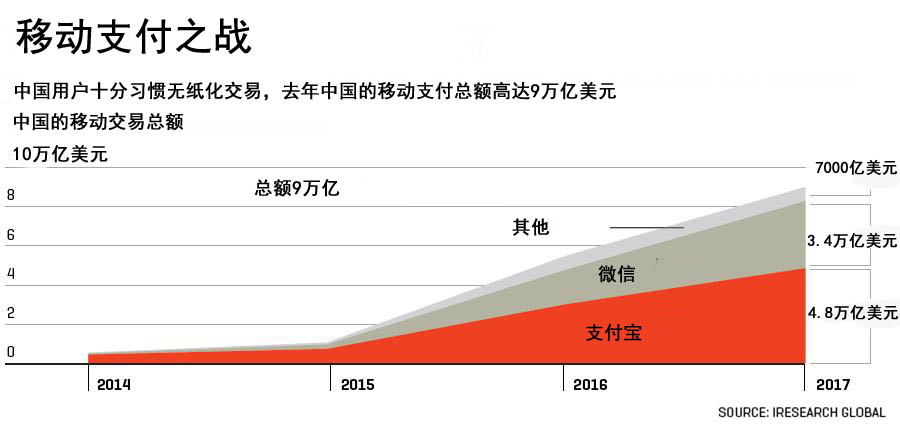 ?
?
|
確實(shí)如此,,微信最近的賬號(hào)數(shù)已超10億(因?yàn)橐恍┯脩粲胁恢挂粋€(gè)微信賬號(hào)),因此微信更像是一個(gè)服務(wù)于整個(gè)經(jīng)濟(jì)體系的數(shù)字操作平臺(tái),。這并非偶然,。2014年微信推出了“紅包”功能,效仿的是中國(guó)上千年來(lái)新年發(fā)紅包的習(xí)俗,。這一功能火爆全網(wǎng),,截至去年年底,已經(jīng)有8億用戶的微信綁定了銀行賬號(hào),?!叭缃裨谥袊?guó)各行各業(yè),無(wú)論是停車場(chǎng),、菜市場(chǎng)甚至是寺廟,、街上的乞丐都接受掃一掃微信支付?!瘪R化騰不無(wú)得意地說(shuō),。 正因?yàn)榭梢郧擅畹乩每萍歼m應(yīng)文化習(xí)慣,騰訊和阿里才能擺脫抄襲的身份不斷發(fā)展,?!八麄兊某晒υ谟谖幕瘎?chuàng)新”,,紐約社會(huì)學(xué)家、現(xiàn)為研究中國(guó)社會(huì)數(shù)字行為的咨詢師崔西亞·王說(shuō),,“他們能夠駕馭文化,,才走到了今天這一步”,她指的是騰訊紅包產(chǎn)品的成功和阿里的雙11戰(zhàn)略,。“他們像園丁進(jìn)行植物嫁接一樣,,進(jìn)行了文化嫁接,。”但這種靈活性也加劇了兩個(gè)公司的沖突,。2014年中國(guó)的在線支付交易81%是通過(guò)支付寶實(shí)現(xiàn)的,。目前,中國(guó)的移動(dòng)支付市場(chǎng)已經(jīng)翻了16番,,支付寶的市場(chǎng)占比降低到54%,,微信支付占了38%。 騰訊的下一個(gè)工作重點(diǎn)是將零售市場(chǎng)從線上轉(zhuǎn)移到線下,,阿里巴巴志亦在此,,這也并非巧合。騰訊把自己的項(xiàng)目稱為“智慧零售”,,阿里巴巴的是“新零售”,,騰訊的服務(wù)主要圍繞微信的兩個(gè)獨(dú)有功能展開(kāi)。一個(gè)是“公眾號(hào)”,,品牌和其他商家可以通過(guò)微信公眾號(hào)接觸用戶,。另外一個(gè)是“小程序”,一種搭建在微信平臺(tái)內(nèi)部的輕型應(yīng)用,,比起從零開(kāi)始做起的應(yīng)用程序,,需要的開(kāi)發(fā)力量更少,也無(wú)須下載,。 |
Indeed, with WeChat recently having surpassed 1 billion accounts— some users have more than one—the service is becoming something akin to a digital operating system for the entire economy. This isn’t an accident. In 2014, WeChat offered a digital product called a “red envelope” that mimicked the centuries-old custom of giving gifts of money at the Chinese New Year. The feature went viral, and by the end of last year, 800 million users had linked WeChat to their bank accounts. “Now everywhere in China, in parking lots, farmers’ markets, even at temples, and beggars on the streets, they all accept WeChat Pay with a simple scan,” boasts Pony Ma. The shrewd adoption of technology to cultural norms shows how both Tencent and Alibaba have moved well past copycat status. “Their success is due to their ability to be culturally innovative,” says Tricia Wang, a New York–based sociologist turned consultant who studies social digital behavior in China. “They got to where they are by hijacking the culture,” she says, citing Tencent’s red envelope success as well as Alibaba’s Singles Day stratagem. “They did a culture graft in the same way horticulturists perform grafts on plants.” This agility also has put the companies on a collision course. In 2014 Alipay powered 81% of online payments in China, per iResearch data. And while the mobile-pay market has grown some 16-fold since then, Alipay’s share has shrunk to 54%, while WeChat Pay now commands 38%. It’s also no coincidence that Tencent has identified as its next big thrust the online-to-off-line retail market that Alibaba also covets. Tencent calls its efforts “smart retail,” compared with Alibaba’s “new retail,” and Tencent’s offerings are centered around two features unique to WeChat. One is the “official account,” a kind of template for brands and other businesses to reach consumers through WeChat. The other is the “mini-app,” a lightweight application inside WeChat that requires less development effort than a built-from-scratch app and doesn’t require consumers to download anything. |
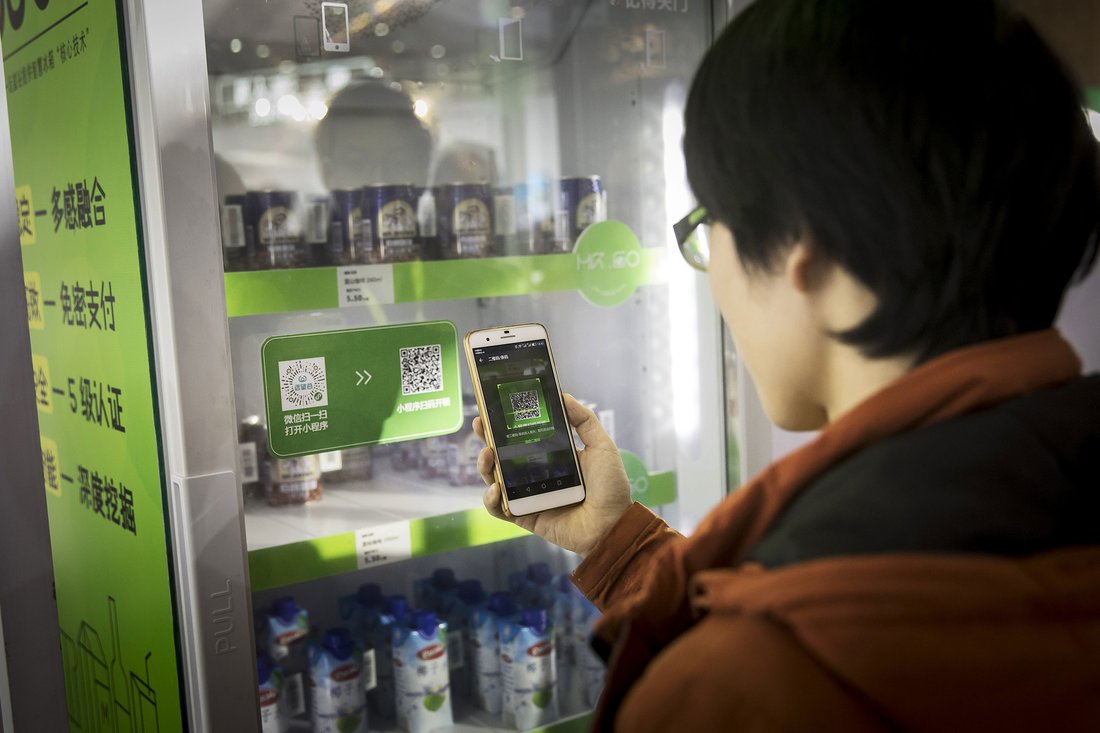
|
盡管去年才面世,,小程序已經(jīng)席卷中國(guó)電子商務(wù)?!耙?yàn)橛辛诵〕绦?,微信開(kāi)始看到社交商務(wù)的爆炸式發(fā)展正在改變中國(guó)的面貌?!绷闶鄯治鰩燀f恩斯威格說(shuō),。(美國(guó)的社交媒體巨頭也試圖開(kāi)發(fā)這一領(lǐng)域,但成果寥寥。)韋恩斯威格說(shuō)2017年中國(guó)的零售業(yè)銷量增加了10.2%,,美國(guó)增加了4.2%,,而微信一年之間增加的小程序數(shù)是蘋果商店推出頭四年增加的應(yīng)用軟件總和。 像阿里巴巴一樣,,騰訊也投資了一些零售商和服務(wù)供應(yīng)商,,最重要的兩筆投資是上市公司京東和IPO大熱門美團(tuán)點(diǎn)評(píng),京東是阿里巴巴的主要電商對(duì)手,,后者是阿里最近收購(gòu)的餓了嗎在外賣界的對(duì)頭,。騰訊對(duì)零售的興趣并非為了攻擊阿里,而是根據(jù)其業(yè)務(wù)的商業(yè)發(fā)展邏輯形成的,。騰訊戰(zhàn)略總監(jiān),、智慧零售項(xiàng)目主管Davis Lin在深圳的一次采訪中說(shuō),“零售占中國(guó)GDP的40%~50%,。(美國(guó)只有大概26%,。)零售“和用戶的生活息息相關(guān)”,他接著說(shuō)道,,由此引用了騰訊的使命,,“通過(guò)互聯(lián)網(wǎng)服務(wù)提升人類生活品質(zhì)”。微信的許多服務(wù)都是免費(fèi)的,,因此微信支付是利用各類活動(dòng)賺錢的重要門戶,。“我們用了差不多四年的時(shí)間發(fā)展到現(xiàn)在這個(gè)高度,,阿里巴巴用了超過(guò)十年”,,他指的是微信支付的用戶數(shù)量,“現(xiàn)在要開(kāi)始真正的競(jìng)爭(zhēng)了,?!? 多年以來(lái),阿里巴巴和騰訊視彼此為對(duì)手,,只因?yàn)樗麄兌际侵袊?guó)互聯(lián)網(wǎng)現(xiàn)象中取得成功的知名企業(yè),。一開(kāi)始他們甚至并沒(méi)那么成功。和20世紀(jì)90年代末的“門戶”網(wǎng)站巨頭相比,,馬化騰回憶道:“我們是互聯(lián)網(wǎng)產(chǎn)業(yè)浪潮中的小兄弟,,我們只是二三線的小公司?!? 這兩個(gè)小兄弟也曾試探性地進(jìn)入對(duì)方的領(lǐng)域,,但沒(méi)取得什么成績(jī)。比如說(shuō)阿里曾成立游戲部門,、開(kāi)發(fā)社交網(wǎng)絡(luò),,但都沒(méi)有火起來(lái),。騰訊建立了電商網(wǎng)站拍拍,但最終把它賣給了京東,。微信的快速崛起使騰訊成為一個(gè)社會(huì)級(jí)現(xiàn)象,,2013年,馬云公開(kāi)呼吁員工眾志成城“殺死企鵝”,,這明顯指的是騰訊那只不會(huì)飛的吉祥物,。(中國(guó)公司很喜歡用動(dòng)物作自己的標(biāo)志,阿里巴巴高端商城天貓的吉祥物是天貓,,盒馬的標(biāo)志是一只憨態(tài)可掬的河馬,,螞蟻金服用名字就能說(shuō)明一切了。) 馬云對(duì)微信的擔(dān)憂是有道理的,。騰訊2014年初推出了紅包功能,支付寶在移動(dòng)金融服務(wù)領(lǐng)域突然有了一個(gè)實(shí)力頗強(qiáng)的對(duì)手,。阿里巴巴的這位執(zhí)行主席在阿里的社交媒體網(wǎng)站上將騰訊的行為稱為“珍珠港襲擊”,,稱其計(jì)劃完美、執(zhí)行縝密,。這導(dǎo)致了兩家公司在支付,、零售、云計(jì)算,、人工智能,、醫(yī)療健康產(chǎn)品以及其他一些市場(chǎng)領(lǐng)域中都產(chǎn)生了沖突。馬化騰說(shuō)他數(shù)了數(shù),,有十幾個(gè)領(lǐng)域,,“我們都和阿里巴巴有激烈競(jìng)爭(zhēng)?!笨赡苡悬c(diǎn)兒太多了,。“有時(shí)候我會(huì)說(shuō):‘真的嗎,?這個(gè)也要競(jìng)爭(zhēng),?’我有時(shí)都覺(jué)得煩?!? 騰訊的領(lǐng)導(dǎo)可能覺(jué)得有點(diǎn)煩,,但他在阿里巴巴的對(duì)手卻被徹底激怒了。阿里巴巴副主席蔡崇信說(shuō)起對(duì)手時(shí)毫不遮掩,,公開(kāi)稱騰訊的游戲讓人上癮,,中國(guó)的政府機(jī)構(gòu)也正是這么說(shuō)的?!跋胂肟?,”蔡崇信有次在洛杉磯吃早餐時(shí)說(shuō),,“他們的產(chǎn)品讓人上癮,極不利于孩子的身心健康,,這和煙草公司有什么區(qū)別,?”(騰訊的游戲業(yè)務(wù)是全球性的:蔡崇信說(shuō),他的兒子是大熱互聯(lián)網(wǎng)生存游戲《堡壘之夜》的狂熱粉絲,,《堡壘之夜》是由北卡羅來(lái)納州的傳奇游戲公司Epic Games發(fā)行的,,騰訊在該公司控股40%。)蔡崇信推測(cè)道,,騰訊要轉(zhuǎn)向零售或許和這點(diǎn)有關(guān),。“他們可能認(rèn)識(shí)到了這一點(diǎn),,因此對(duì)自己說(shuō),,‘等一等,我們做的生意好像不對(duì),?!? 蔡崇信可能誤解了騰訊的動(dòng)機(jī),但無(wú)論如何,,他覺(jué)得阿里巴巴的實(shí)力更強(qiáng),。“騰訊已經(jīng)覺(jué)醒了,,決定要在電子商務(wù)中占據(jù)一席之地,,”他說(shuō),“但是我們做這個(gè)已經(jīng)做了19年……這個(gè)生意并不僅僅是給用戶開(kāi)發(fā)一個(gè)應(yīng)用軟件或者產(chǎn)品,,而是為顧客建立生態(tài)系統(tǒng)和供應(yīng)鏈,。” |
Introduced only last year, mini-apps have taken Chinese e-commerce by storm. “Because of mini-apps, WeChat is starting to see this explosion of social commerce that is changing the face of China,” says Weinswig, the retail analyst. (This is an area America’s social media giants have attempted to exploit, with little success.) Weinswig says total 2017 retail sales were up 10.2% in China, compared with 4.2% in the U.S., and that WeChat added about as many mini-apps in a year as Apple’s online store added apps in its first four years. Like Alibaba, Tencent has invested in retailers and service providers. The two most prominent are publicly held JD.com, Alibaba’s biggest e-commerce competitor, and Meituan Dianping, the food-delivery foe of Alibaba’s recently acquired Ele.me and a hot IPO prospect. Tencent frames its interest in retailing not as an attack on Alibaba as such but rather as a logical progression of its business. “Retail is 40% to 45% of the GDP of China,” says Davis Lin, Tencent’s strategy chief and head of its “smart retail” effort, in an interview in Shenzhen. (The comparable figure in the U.S. is only about 26%.) Retail “is related to every bit of a user’s life,” Lin goes on, evoking Tencent’s mission of “enhancing the quality of human life through Internet services.” Many of WeChat’s services are free, making payments a key gateway to cashing in on all this activity. “We’ve been able to climb to where we are in roughly four years, which took Alipay more than 10 years,” says Lin, referring to the number of users on WeChat Pay. “Now it’s a real competition.” FOR YEARS ALIBABA and Tencent were rivals only in the sense that both were successful and prominent examples of the Chinese Internet phenomenon. At first they weren’t even that successful. “We were little brothers in the Internet industry playground,” Pony Ma reflects, compared with the leading “portals” of the late 1990s. “We were second- or even third-tier companies.” Over time, the two probed the other’s perimeter, to relatively little effect. Alibaba, for instance, launched a gaming division and a social network, neither of which caught fire. Tencent built an e-commerce site, called Paipai, but eventually sold it to JD.com. The rapid rise of WeChat, however, made Tencent a societal phenomenon, and in 2013, Jack Ma publicly urged employees to band together to “kill penguins,” an unmistakable swipe at Tencent’s flightless mascot. (Corporate China loves its animal-themed standard-bearers: The mascot of Alibaba’s high-end shopping site is the Tmall Cat, its Hema grocery store’s logo is a lovable-looking hippo, and Ant Financial’s namesake is self-evident.) Jack Ma was right to be concerned about WeChat. Tencent launched its red envelope program in early 2014, and suddenly Alipay had a credible competitor in mobile financial services. The Alibaba executive chairman, writing on an Alibaba social media site, labeled Tencent’s action a “Pearl Harbor attack” that had been “beautifully planned and executed.” That led to skirmishes in market segments like payments, retail, cloud computing, artificial intelligence, health care initiatives, and more. Pony Ma says he has counted more than 10 areas “where we fight Alibaba fiercely.” Perhaps too many. “Every now and then I say, ‘Really, this area too?’ It bothers me sometimes.” Tencent’s chief may be bothered, but his counterparts at Alibaba seem downright agitated. Joe Tsai, the vice chairman, doesn’t mince words about his rival. He calls out Tencent’s games for being addictive, as have government agencies in China. “Think about it,” Tsai says over breakfast in Los Angeles. “They make a product that’s addictive, that is not terribly healthy for kids. How’s that different from a cigarette company?” ( Tencent’s reach in gaming is global: Tsai notes that his son has become an avid fan of the virally popular “battle royale” game Fortnite, published by North Carolina’s Epic Games, in which Tencent holds a 40% stake.) Tsai surmises that Tencent’s pivot to retailing is connected. “They probably came to an existential realization and said, ‘Wait a minute, we’re in the wrong business.’” Tsai may be misinterpreting Tencent’s motives, but regardless, he thinks Alibaba holds the stronger hand. “Tencent has woken up and decided that they also want to become somebody in e-commerce,” he says. “But we’ve been doing this for the last 19 years … It’s not just about developing an app or a product for users. It’s about creating an ecosystem and also the supply chains for the merchants.” |
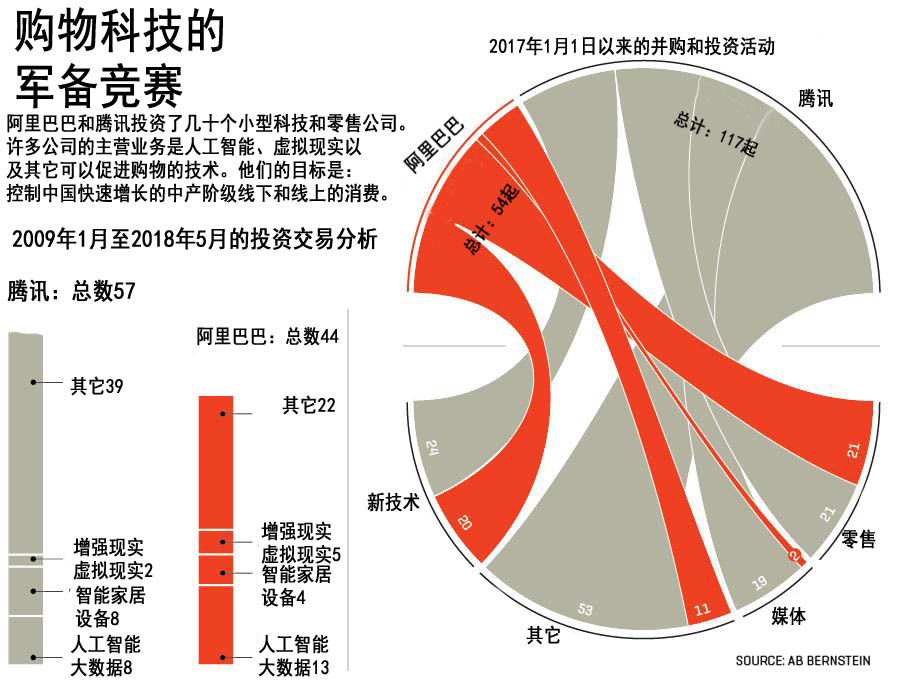 ?
?
|
生態(tài)系統(tǒng)是個(gè)運(yùn)營(yíng)詞匯,,兩家公司在保護(hù)自己的平臺(tái)上都不遺余力,。每家公司都大手筆投資了共享單車、在線打車等新潮的服務(wù)應(yīng)用,,目的是為了更好地把用戶鎖定在自己的生態(tài)系統(tǒng)和相應(yīng)的支付服務(wù)中,,在這個(gè)人們熱愛(ài)使用移動(dòng)支付購(gòu)物的國(guó)家,鎖定支付服務(wù)十分關(guān)鍵,。(比如說(shuō),,如果你想用阿里巴巴的平臺(tái)伙伴Ofo單車,用騰訊的微信支付就很不方便,;如果要用騰訊陣營(yíng)里的共享單車品牌摩拜單車,,用支付寶就很麻煩。)兩家公司成功建立了互聯(lián)網(wǎng)版本的“圍墻花園”,,香港普華永道的咨詢師湯姆·波特威斯特爾說(shuō),,他對(duì)這兩家公司都進(jìn)行了大量研究,。“用戶無(wú)法在兩個(gè)互聯(lián)網(wǎng)平臺(tái)中隨意切換,?!北热缯f(shuō),要想從微信直接進(jìn)入淘寶就很麻煩,。這和硅谷巨頭之間的相處方式相比,,顯得不太紳士。蘋果應(yīng)用商店中有Facebook和谷歌的應(yīng)用程序,。波特威斯特爾說(shuō)這些西方公司雖然可能“亦敵亦友,,但他們共同構(gòu)建了完整的互聯(lián)網(wǎng)用戶體驗(yàn)?!辈幌耱v訊和阿里巴巴,。 但在極少數(shù)情況下,兩家公司也會(huì)共同投資,,就像2013年他們和平安保險(xiǎn)(平安CEO也姓馬)共同成立了一家互聯(lián)網(wǎng)保險(xiǎn)公司眾安公司,。事實(shí)上,如果歷史有規(guī)律可循,,這兩個(gè)公司之間的明爭(zhēng)暗斗最終都會(huì)變成這種合作?!膀v訊內(nèi)部,,人們很看好阿里巴巴,”一個(gè)前騰訊圈內(nèi)人士這么說(shuō),,“他們都在淘寶上買東西,。”而且,,騰訊必須要進(jìn)行大規(guī)模投資,,而且要采用不同方式,才能比得上阿里巴巴的物流實(shí)力和菜鳥(niǎo)聯(lián)盟,?!拔⑿攀且粋€(gè)重要入口,但僅此而已,?!边@位前內(nèi)部人士說(shuō)。與此同時(shí),,因?yàn)榘⒗镎谥鞴メ斸數(shù)壬虡I(yè)應(yīng)用,,阿里也明白它自己沒(méi)有辦法挑戰(zhàn)微信在消費(fèi)者通信服務(wù)中的主導(dǎo)地位。阿里CEO張勇也承認(rèn):“連我都用微信,?!? 從阿里和騰訊各自的投資戰(zhàn)略上,,雙方的較量最明顯。兩家公司都熱衷投資,,香港Bernstein公司精明的分析師巴夫托什·瓦杰帕伊數(shù)了數(shù),,過(guò)去三年騰訊總共進(jìn)行了280筆投資,阿里巴巴是174筆,?!罢l(shuí)能真正了解阿里巴巴和騰訊投資的所有項(xiàng)目呢?”瓦杰帕伊在給客戶的報(bào)告中寫道,。他把這兩家有投資狂熱癥的公司定義為“購(gòu)物狂”,,懷疑可能他們“對(duì)自己的投資(都沒(méi)有)記錄,而考慮到投資的種類和數(shù)量巨多,,可能這些投資莫名就消失了,。” 兩家公司的投資風(fēng)格明顯不同,。阿里喜歡買下公司的多數(shù)股權(quán)甚至全權(quán)控股,,也反映了蔡崇信所說(shuō)的阿里的“運(yùn)營(yíng)思維”。阿里在東南亞的投資正是采用了這種模式,,控股電商網(wǎng)站Lazada,,任命阿里巴巴的聯(lián)合創(chuàng)始人及多年高管彭蕾作CEO。相比之下,,騰訊更喜歡進(jìn)行多筆小額投資,,比如購(gòu)買美國(guó)游戲巨頭動(dòng)視暴雪( Activision Blizzard)5%的股份。即使騰訊取得了公司的控股權(quán),,通常也不干涉管理事務(wù),。比如洛杉磯的拳頭公司 (Riot Games) ,騰訊在獲得拳頭的熱門游戲《英雄聯(lián)盟》授權(quán)的同時(shí),,也和公司的風(fēng)投機(jī)構(gòu)一起進(jìn)行了投資,。之后騰訊全額買下拳頭——但并不插手公司的運(yùn)營(yíng)?!八麄冎廊绻覀兊孟蚬镜脑S多高級(jí)副總不停匯報(bào)各種事情,,會(huì)毀掉我們的很多價(jià)值?!比^的聯(lián)合創(chuàng)始人馬克·邁瑞爾說(shuō),。 |
Ecosystem is the operative word, and both companies can have sharp elbows when protecting their platforms. Each has invested aggressively in newfangled app-driven services like bike sharing and ride hailing, the better to lock in users to their ecosystems—and their respective payment services, key features, in a country where consumers are more than happy to forgo cash when they shop. (If you want to use Alibaba platform partner Ofo, for example, it is relatively inconvenient to pay with Tencent’s WeChat Pay; using Alipay is a hassle when renting with Mobike, the bike-share contestant in Tencent’s camp.) The two have effectively created “walled-garden” versions of the Internet, argues Tom Birtwhistle, a consultant with PwC in Hong Kong who has studied both companies extensively. “Consumers are blocked from traversing the two Internets.” You can’t move easily, for instance, from WeChat to Taobao. That’s a far less genteel approach than Silicon Valley’s titans take with one another: Apple hosts apps from Facebook and Google, for example. Those Western companies, argues Birtwhistle, may be “frenemies, but they’ve assembled together to form an integrated online experience.” Not so Tencent and Alibaba. On rare occasions, the two invest together, as they did in 2013 by starting an online insurance company, called ZhongAn, with insurer Ping An (whose CEO also is named Ma). Indeed, if history repeats, it’s possible that many of the companies’ jabs and feints at each other’s properties will amount to just that. “Internally, Tencent people hold Alibaba in high regard,” says one former Tencent insider. “They all buy on Taobao.” What’s more, Tencent would have to invest heavily and in a new way to match the physical logistics prowess of Alibaba and its Cainiao affiliate. “WeChat is positioned to be an important entry point, but no more,” says the insider. At the same time, as it focuses on business applications like DingTalk, Alibaba understands it can’t challenge WeChat’s dominance in consumer messaging. Acknowledges Daniel Zhang, Alibaba’s CEO: “Even I use WeChat.” THE AREA WHERE the Tencent-Alibaba battle is most obvious is in their respective investment strategies. The two have been such assiduous dealmakers that the astute Hong Kong–based Bernstein analyst Bhavtosh Vajpayee counted 280 Tencent deals over the past three years and 174 for Alibaba. “Who can possibly fathom everything Alibaba and Tencent have invested in already?” Vajpayee writes in a report to clients. Branding the deal-crazy companies “shopaholics,” he wonders if they “have a record of their doings, [as] investments and stakes can get lost in the crevices somewhere, given the sheer numbers involved.” The two have clearly divergent styles. Alibaba tends to take large or controlling stakes, reflecting what Joe Tsai calls the company’s “operating mindset.” That’s been the case in Southeast Asia, where it took control of e-commerce site Lazada and installed Lucy Peng, an Alibaba cofounder and longtime executive, as CEO. Tencent, in contrast, favors multiple small stakes, such as its 5% share of U.S. gaming giant Activision Blizzard. And when it does take control, it typically leaves management in place. At Riot Games in Los Angeles, for example, Tencent invested alongside the company’s venture capitalists when it licensed Riot’s popular League of Legends title. Later it bought the company outright—but didn’t mess with how it’s run. “They were selfaware that it would destroy a lot of value if we had reported to some SVP of such and such,” says Marc Merrill, Riot’s cofounder. |
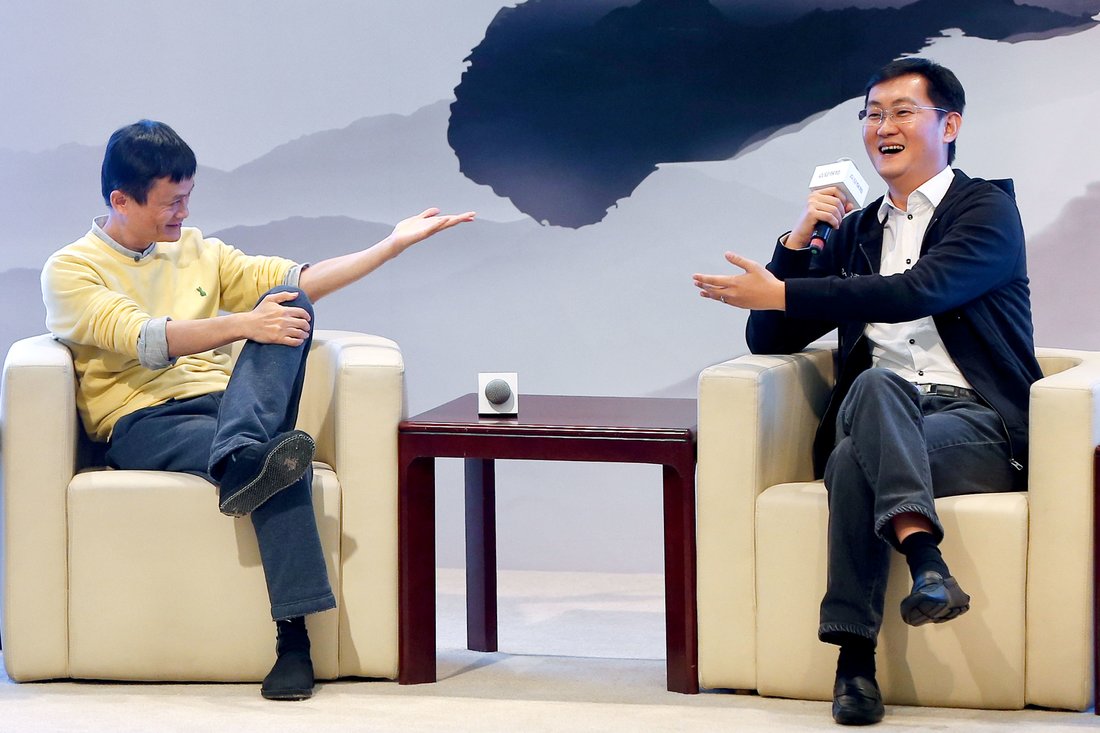
|
不干涉不意味騰訊總是表現(xiàn)良好,。模仿在騰訊文化中根深蒂固,,騰訊也毫不回避在獲得其合作伙伴產(chǎn)品授權(quán)的同時(shí)開(kāi)發(fā)類似產(chǎn)品,。“騰訊既是投資者,,也是競(jìng)爭(zhēng)者,。”洛杉磯創(chuàng)業(yè)公司Smule的聯(lián)合創(chuàng)始人兼CEO杰夫·史密斯說(shuō),,他們公司開(kāi)發(fā)的移動(dòng)應(yīng)用可以讓5000萬(wàn)用戶每天彈奏或演唱2000多萬(wàn)首歌,,而且很多時(shí)候是大家共同演唱?!八麄兇蛟斐晒萍脊镜臋?quán)力政治觀和我們的很像”,,史密斯說(shuō),他指的是QQ和微信的競(jìng)爭(zhēng)故事,。這個(gè)創(chuàng)業(yè)家將騰訊稱為一個(gè)“很好的合作伙伴”,,因?yàn)镾mule可以接入騰訊的內(nèi)容分發(fā)網(wǎng)絡(luò),谷歌和亞馬遜都有類似的競(jìng)爭(zhēng)產(chǎn)品,。騰訊哪怕并不直接收購(gòu)公司,,也因?yàn)閺V泛投資而和各類公司的優(yōu)秀技術(shù)和人才保持密切關(guān)系,從中獲益良多,。 |
Being hands-off doesn’t mean Tencent always plays nice. Imitation is ingrained inits culture, and Tencent doesn’t shy away from simultaneously licensing the products of its partners and creating similar offerings. “Tencent is both an investor and a competitor,” says Jeff Smith, co-founder and CEO of San Francisco startup Smule, whose mobile apps allow a community of 50 million users to play and sing more than 20 million songs a day, often with each other. “Their views on the realpolitik of building successful technology companies reflect our own,” says Smith, citing the storied QQ-versus-WeChat competition. The entrepreneur calls Tencent a “great partner,” including, for example, the access Smule gets to Tencent’s content distribution network, a service that competes against Google and Amazon. Tencent, in turn, benefits from its broad investing by keeping close tabs on smart technology and talented people, even without owning their companies outright. |
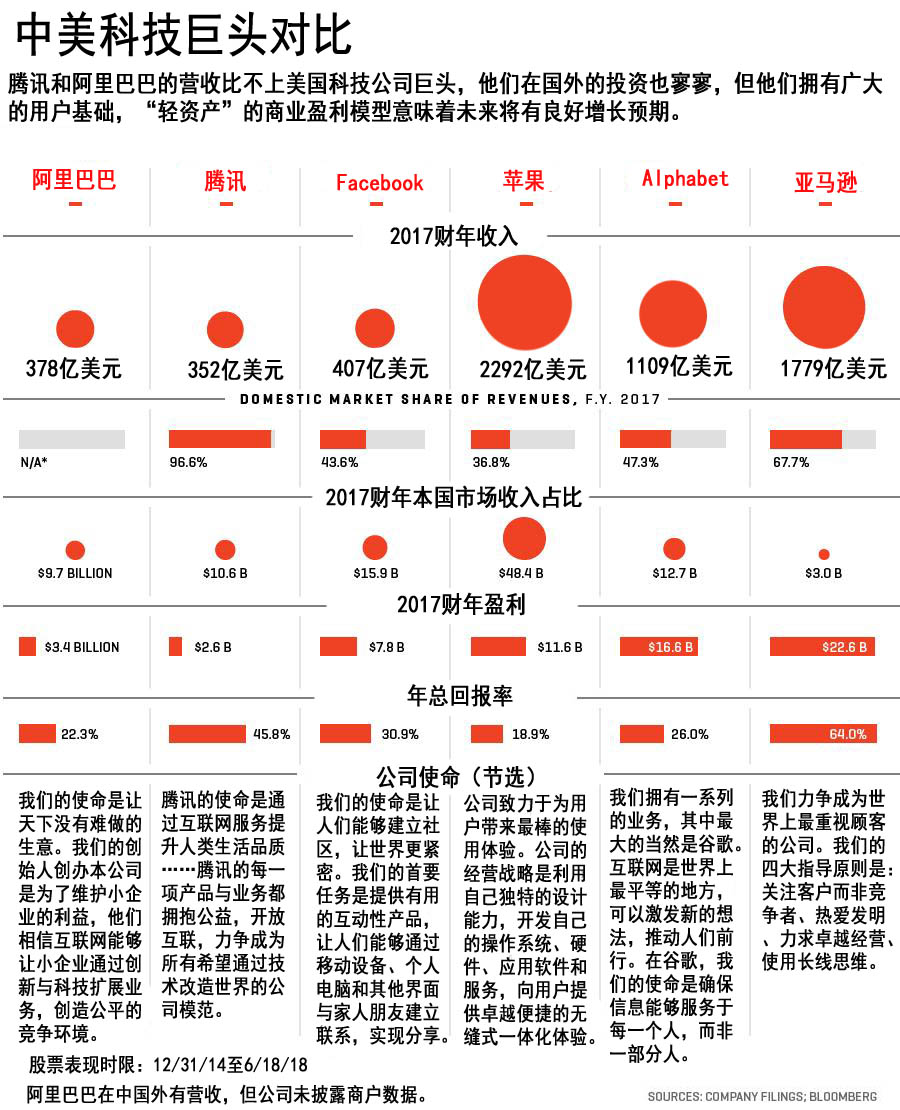
|
公司的投資風(fēng)格也體現(xiàn)了他們對(duì)國(guó)外業(yè)務(wù)的探索,。盡管國(guó)內(nèi)收入占公司總收入的極大比重,但兩家公司都已經(jīng)將目光投向了東南亞,。騰訊在新加坡上市游戲企業(yè)SEA中占股40%,,而且據(jù)說(shuō)正在考慮其他大規(guī)模投資。阿里巴巴戰(zhàn)略目標(biāo)宏大,,表示希望公司可以為20億顧客提供服務(wù),將東南亞作為首個(gè)主要開(kāi)拓市場(chǎng),?!皷|南亞和中國(guó)的經(jīng)濟(jì)發(fā)展類似?!辈坛缧耪f(shuō),,他的意思是年輕人口多、手機(jī)持有率高,、零售產(chǎn)業(yè)開(kāi)發(fā)不足,。蔡崇信說(shuō):“這些特點(diǎn)和中國(guó)差不多,而且還沒(méi)有傳統(tǒng)工業(yè)的拖累,?!? 這兩家中國(guó)巨頭什么時(shí)候會(huì)對(duì)更成熟的美國(guó)市場(chǎng)發(fā)動(dòng)直接攻擊,這是硅谷一個(gè)老生常談的話題了,。簡(jiǎn)單點(diǎn)說(shuō),,不是最近,。這個(gè)結(jié)論可能會(huì)讓硅谷高管稍微得到點(diǎn)安慰,要知道他們可是為自己的產(chǎn)品完全被排除在中國(guó)市場(chǎng)以外痛苦不已,。盡管已經(jīng)對(duì)許多美國(guó)公司進(jìn)行了投資,,兩家公司都曾以涉及敏感的國(guó)土安全為由被拒絕交易。今年早些時(shí)候,,美國(guó)外國(guó)投資管理委員會(huì)拒絕了螞蟻金服想要購(gòu)買美國(guó)匯款公司速匯金(MoneyGram)的提議,。在之前一個(gè)關(guān)注度沒(méi)那么高的案子里,這個(gè)委員會(huì)也拒絕了騰訊想要投資Here Technologies的提案,,這家德國(guó)數(shù)字地圖公司在美國(guó)有大量業(yè)務(wù),。 這兩家中國(guó)互聯(lián)網(wǎng)巨頭的共同特點(diǎn)是既擁有令人難以置信的快速反應(yīng),又能進(jìn)行長(zhǎng)期規(guī)劃,,這種節(jié)奏對(duì)兩家企業(yè)的領(lǐng)頭馬提出了更高要求,。從馬云身上,你既能感受到緊迫感,,又能看到他的長(zhǎng)線規(guī)劃,。他把辦公區(qū)藏在了阿里巴巴園區(qū)的一個(gè)角落里,從熙熙攘攘的員工樓前,,要穿過(guò)一座小橋,。馬云辦公區(qū)的設(shè)計(jì)參照了蘇州園林的經(jīng)典風(fēng)格。但這一處隱世之地的內(nèi)部設(shè)計(jì)博采眾長(zhǎng),,盡顯馬云飽經(jīng)世故的豐富閱歷,。 5月末煙雨蒙蒙的一天,阿里巴巴的這位創(chuàng)始人選擇在日式會(huì)客廳接受采訪,,室內(nèi)擺放著榻榻米墊子和低矮的椅子,,墻掛式音箱中流淌出柔和的中國(guó)古典音樂(lè)。他來(lái)之前,,桌上已經(jīng)擺好了兩碗櫻桃,,兩杯茶水裊裊生煙。馬云的思維方式注重未來(lái)導(dǎo)向,,他說(shuō),,中國(guó)的一位企業(yè)大亨最近告訴他覺(jué)得累了,問(wèn)他怎么能持續(xù)前進(jìn),?!拔遗ぷ魇且獮殡x開(kāi)公司、享受平靜生活的那一天做準(zhǔn)備”,,馬云說(shuō),,“為了那時(shí)候我不用再回來(lái)干修廚房這樣的活。”他還說(shuō):“與此同時(shí),,還有一件事在驅(qū)動(dòng)著我和很多同事:我們總想為社會(huì)做點(diǎn)好事,。” 會(huì)議結(jié)束后,,馬云乘車前往阿里巴巴的禮堂,,出席數(shù)百名新員工的歡迎典禮。他告訴大家,,阿里的日子不好過(guò),。“你可能得花上一年時(shí)間才能弄明白我們?cè)诟墒裁础?,他提醒大家,,“三年以后,你才有可能成為一個(gè)真正的阿里人,?!彼嬖V這些新兵,阿里巴巴有理想,、務(wù)實(shí)而樂(lè)觀,,但不是每一個(gè)人都能適應(yīng)?!斑€有時(shí)間離開(kāi)”,,對(duì)著哄堂大笑的眾人,他不動(dòng)聲色地說(shuō)道,。 多年的企業(yè)競(jìng)爭(zhēng)也影響了馬化騰,。在廣州《財(cái)富》論壇上,他對(duì)人們批判騰訊游戲讓人上癮又無(wú)孔不入進(jìn)行回應(yīng)時(shí),,承認(rèn)社會(huì)過(guò)度依賴手機(jī)了,。“我現(xiàn)在坐在這兒,,手機(jī)在臺(tái)下,,都有些焦慮?!彼f(shuō),。他承認(rèn)最近視力更差了,,但并非是因?yàn)樯狭四昙o(jì),,而是因?yàn)榛ㄌ鄷r(shí)間盯著手機(jī)?!拔蚁M乱淮募磿r(shí)通信平臺(tái)不會(huì)對(duì)我們的眼睛造成這么大的負(fù)擔(dān),。如果只需要腦電波就可以把信息傳到大腦里,簡(jiǎn)直完美?!? 給他點(diǎn)時(shí)間,,夢(mèng)想可能成真。再過(guò)段時(shí)間,,阿里巴巴可能也會(huì)推出一個(gè)腦電波平臺(tái)——再用一個(gè)毛茸茸的小動(dòng)物當(dāng)吉祥物,。(財(cái)富中文網(wǎng)) Eamon Barrett和 Kurt Zhong對(duì)報(bào)道亦有補(bǔ)充。 本文另一版本發(fā)表在2018年7月1日的《財(cái)富》雜志,,標(biāo)題為《二馬之爭(zhēng)》,。 譯者:Agatha? |
Investment styles also inform the companies’ search for growth outside China. Their home country accounts for the lion’s share of overall revenue for both companies. But both have set their sights on Southeast Asia. Tencent owns a 40% stake in the publicly traded Singapore gaming company SEA and has reportedly been considering other large investments. Alibaba, given to grand strategic goals, has said it wants to serve 2 billion customers and will make Southeast Asia its first major expansion area. “These economies are very similar to how China grew up,” says Joe Tsai, citing youthful populations, high levels of mobile-phone penetration, and an underdeveloped retail sector. “These are very similar characteristics that we see in China, without the existing baggage of traditional industries,” says Tsai. When the two Chinese giants might attack the more-developed U.S. market directly has been a perennial discussion point among their Silicon Valley counterparts. The short answer is not soon—a conclusion that may serve as some consolation for U.S. executives smarting at their near-total exclusion from the Chinese market. Despite having made many investments in U.S. companies, each has been swatted away from deals deemed sensitive on national-security grounds. Earlier this year, the intergovernmental Committee on Foreign Investment in the United States blocked Ant Financial’s attempt to buy U.S. remittance company MoneyGram. In a less closely watched move, CFIUS also nixed an investment by Tencent in Here Technologies, a Dutch digital mapping company with significant operations in the U.S. ONE OF THE HALLMARKS of the Chinese Internet powerhouses is that they simultaneously move incredibly quickly and plan for the very long term—a tiring pace that demands a lot of the two horses who lead them. Jack Ma exudes that dual sense of urgency and longrange planning. His office complex is tucked away in a corner of the Alibaba campus, across a small bridge from the chockablock buildings where his employees work. He has designed his compound in the fashion of the classical gardens of Suzhou, a treasured, ancient spot near Hangzhou. But the eclectic look of Ma’s corporate hideaway reflects his man-of-the-world sensibilities, with various cultures represented inside its walls. On a smoggy day in late May, the Alibaba founder chooses to meet in his Japanese sitting room, with tatami mats, low-slung chairs, and traditional Chinese instrumental music playing softly on wall speakers. Two bowls of cherries and two cups of steaming tea are set down before he arrives. Ma’s mind is very much on the future. He relates that a fellow Chinese corporate mogul has recently told him he’s tired, and asked Ma how he keeps going. “I work hard because I’m prepared for the day when I leave this company and I can enjoy a peaceful life,” says Jack Ma. “I won’t have to come back to do something, like fix the kitchen,” he says. “In the meantime, this is the thing that drives me and so many of my associates: We always want to do good things for society.” At the conclusion of this meeting, Ma hops in a car to go to an Alibaba auditorium to greet hundreds of new employees. He warns them that life at Alibaba won’t necessarily be easy. “It takes a year to even figure out what’s going on,” he cautions. “And you’re not a true ‘Aliren’”—the Alibaba analog to “Googler”—“before three years of service.” He tells the recruits Alibaba is idealistic, pragmatic, and optimistic, but that it’s not for everyone. “There’s still time to leave,” he deadpans to hearty guffaws in the room. The years of entrepreneurial battles are catching up with Pony Ma as well. At the Fortune conference in Guangzhou, he addressed criticism about the addictive and omnipresent nature of products like Tencent’s games by acknowledging society’s overattachment to their phones. “Even I get a bit anxious sitting here while my phone is offstage,” he said. He allows that just recently his eyesight has gotten worse, which he attributes not so much to the onset of middle age as to too many hours spent staring at his phone. “I wish the next-gen instant-messaging platform would not be such a burden on your eyes,” he said. “If there’s a brain wave that can transmit the message to my consciousness, that would be perfect.” Give him time, and it just might happen. Wait a little longer, and Alibaba just might launch a brain-wave platform, too—with a cuddly critter for a mascot. Additional reporting by Eamon Barrett and Kurt Zhong A version of this article appears in the July 1, 2018 issue of Fortune with the headline “Ma Vs. Ma.” |













